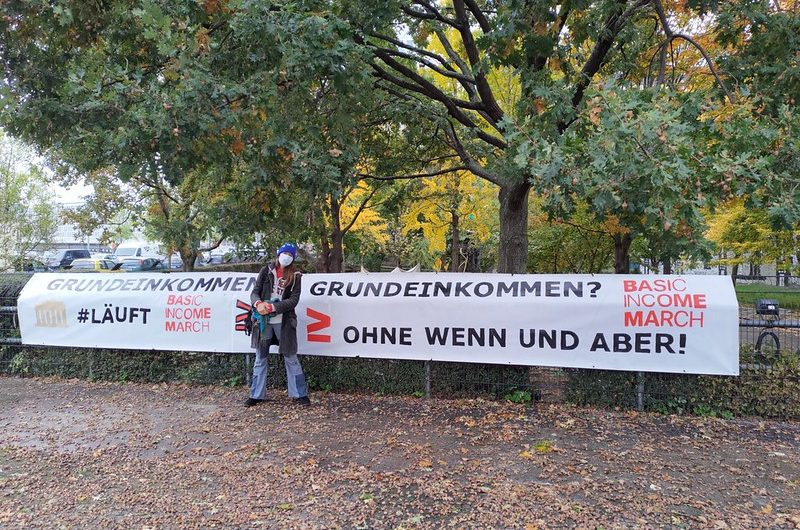
Volksabstimmung via Flickr
Universal Basic Income in Germany

Milena Kagel
Ms. Milena Kagel is a research intern at AICGS for the summer of 2022. She supports resident fellows with their research projects, manages databases, and helps organize and document AICGS events.
Ms. Kagel graduated from Oberlin College in 2020, where she studied History and German Studies. She spent her third year of college studying abroad at the Ludwig-Maximilians-Universität in Munich as part of an exchange program sponsored by the Federation of German-American Clubs. Her research interests include topics related to migration, education, historical memory and youth culture in Germany and Austria.
After graduating from college, Ms. Kagel spent two years work as an English Teaching Assistant through Fulbright Austria's USTA program. She will begin a Master's program in History at the University of Vienna this fall.
This past spring, eye-catching posters from the organization Expedition Grundeinkommen (Expedition Basic Income) could be seen all over Berlin. With their colorful, cartoonish images and hopeful slogans (“more solidarity,” “less existential fear”) these posters drew attention to a concept that has grown in relevance, public recognition, and political support in recent years in Germany: universal basic income. Universal basic income (UBI) refers to an economic model under which each person (or adult citizen) living in a country receives a monthly payment from the government, regardless of their ability to work or demonstrate specific needs. Since 2019, Expedition Grundeinkommen has gathered support for state-run trials of UBI policies.
The concept of UBI goes back to the late eighteenth century, when the political theorists Thomas Paine and Thomas Spence first proposed raising taxes and redistributing wealth with the aim of ensuring basic welfare for all people. In the 1960s, the American economist Milton Friedman revived this idea by advocating for a “negative income tax” for the poor as an alternative to traditional welfare systems.
Beyond some basic parameters, UBI is a relatively malleable concept. Many different local and regional programs exist worldwide, and proposed policies are even more varied. People living in the United States might recognize the Alaska Permanent Fund Dividend, which guarantees an annual payment for all state residents funded by oil revenues, or the monthly “freedom dividend” suggested by Andrew Yang in his 2020 campaign for president.
UBI in Germany
One of the most influential proponents of UBI in Germany is the businessman Götz Werner (CEO of dm-drogeriemarkt), who founded the initiative Unternimm die Zukunft (Undertake the Future) to promote guaranteed income policies in 2005. In 2014, the activist Michael Bohmeyer founded the association Mein Grundeinkommen (My Basic Income), whose online publications and monthly lotteries for a year of guaranteed income (1000 euros per month) have increased public awareness of the topic.
UBI has in part emerged as a political response to the 2005 Hartz IV reforms, which made it more difficult for Germans to claim unemployment benefits by establishing stricter requirements and sanctions to encourage people to find work. The increased demand for welfare during the COVID-19 pandemic also prompted many Germans to consider the drawbacks of relying on a highly bureaucratic system.
There is little consensus on what exactly a nationwide UBI policy would look like in Germany. However, most political discussions on the subject assume that guaranteed income would hover around subsistence level and would act as a replacement for social benefits such as unemployment insurance and child support. The revenue for monthly payments would be generated by increasing taxes and reducing bureaucracy associated with social spending.
Envisioning UBI
Discussions of UBI in Germany have generated curiosity, critique, and enthusiasm among politicians and the public. Germans are firmly divided on the issue—a 2019 study from the German Institute for Economic Research includes polls that show that nearly half of Germans (45 to 52 percent) are in favor of UBI. On average, supporters of UBI tend to be younger, more educated people with lower incomes.
Those in favor of adopting UBI emphasize its potential to eliminate widespread poverty, reduce dependency on bureaucratic services, and improve socio-economic equity across Germany. The non-profit Mein Grundeinkommen also highlights UBI’s ideological significance—by “separating itself from the concept of social benefits for [only] the needy,” UBI rejects a paternalistic system that stigmatizes the poor and creates “the basis for … discrimination and ultimately, the division of society.”
Proponents of the policy argue that its implementation could signify an important ideological shift by affirming people’s inherent right to welfare. Critics are more likely to point out how UBI could cause potential disruptions in German society.
Opponents and critics of universal basic income frequently point to the many obstacles that stand in the way of its implementation. The financial burden of introducing UBI is often the first hurdle to be mentioned, as many estimate it would cost around one billion euros a year to provide monthly payments to Germany’s population of 83 million. Others point to the lack of political consensus on UBI—the major political parties in Germany have varied stances on the issue, and a two-thirds majority in the Bundestag would be required to accomplish any sort of major economic reform. Finally, some critics of UBI comment on the potential consequences of dismantling the German state welfare system, such as the erasure of important demographic information about neediness.
Apart from emphatic statements for or against wealth redistribution, discussions of UBI also raise many questions about the details of its implementation. How unconditional should UBI be? Should felons be able to receive the subsidy? What about children? With no existing national UBI programs to act as a model for Germany, there is much room for debate.
The precise value of the monthly payment is frequently debated as well—which magical number strikes the balance between being enough for someone to live on without completely eliminating the need to work or creating too severe of a tax burden for the wealthy? (According to a 2018 poll from Splendid Research, Germans found 1,137 euros a month to be an appropriate amount on average.)
Some of the most intriguing questions raised by this discourse deal with how German society could potentially be transformed by adopting UBI. Proponents of the policy argue that its implementation could signify an important ideological shift by affirming people’s inherent right to welfare. Critics are more likely to point out how UBI could cause potential disruptions in German society, such as inflation or a huge influx of migrants.
UBI in German Politics
As UBI has recently become an increasingly common subject of political discussion in Germany, major parties have begun to outline their position toward it and suggest their own versions of guaranteed income policies.
Currently, the Greens are the strongest supporters of UBI. In 2020, party members proposed introducing a “guaranteed insurance” of subsistence level income (as an alternative to the Hartz IV model of limited unemployment benefits). In 2021, the Greens were the first major political party in Germany to add UBI to their official party program.
The democratic-socialist party die Linke (the Left) has also suggested introducing a basic income of 1,200 euros a month. However, this proposal forgoes the principle of universality, so the money would be reserved for people with financial need. The issue of UBI has proved to be particularly divisive for die Linke. The party has been discussing guaranteed income policies since at least 2007 and has yet to declare an official party position on the topic. Vocal advocates for UBI have formed a committee to promote it within the party, while other members have repeatedly expressed concern that basic income payments might not serve as an effective substitute for social services.
In some ways, it is not surprising that these left-wing parties (which generally support increased social spending) would be more inclined to support UBI policies. However, the adoption of UBI in Germany could ultimately weaken these parties’ appeal and function by reducing people’s dependency on social programs designed or supported by left-wing parties.
For other parties in Germany, their position on UBI appears simply to be a reflection of broader political attitudes. The center-right CDU/CSU (Christian Democratic Union) has generally displayed a conservative attitude toward UBI policies and remains committed to the principles of Hartz IV. The FDP (Free Democratic Party) has historically opposed government intervention in Germany and therefore rejects UBI outright. The FDP instead supports a need-based “liberal citizens’ income” as a replacement for social security.
The SPD (Socialist Democratic Party) has been reluctant to pursue significant economic reforms. Party members have instead proposed a middle-of-the-road solution to the question of modifying Hartz IV, in the form of a “basic income year” that would allow people to bridge a period of unemployment. Chancellor Olaf Scholz has expressed his distaste for UBI as a potential policy, dismissing it as “neoliberalism.”
The right-wing AfD (Alternative for Germany) included a proposal for a guaranteed income policy in its most recent electoral program. In accordance with the party’s nationalist leanings, these payments would only be made available to German citizens.
Outlook
Even amidst all of the discussion and debate of UBI in Germany, policy proposals remain nebulous, and the political path forward is not yet clear. A certain level of uncertainty and apprehension seems inherently linked to an issue as complicated and anomalous as UBI on the national level. That being said, uncertainty about UBI’s feasibility or effects does not necessarily breed cynicism—the posters hung up around Berlin this spring all displayed the same ambivalent but encouraging motto in regard to UBI: Probieren wir’s aus. Let’s try it.








